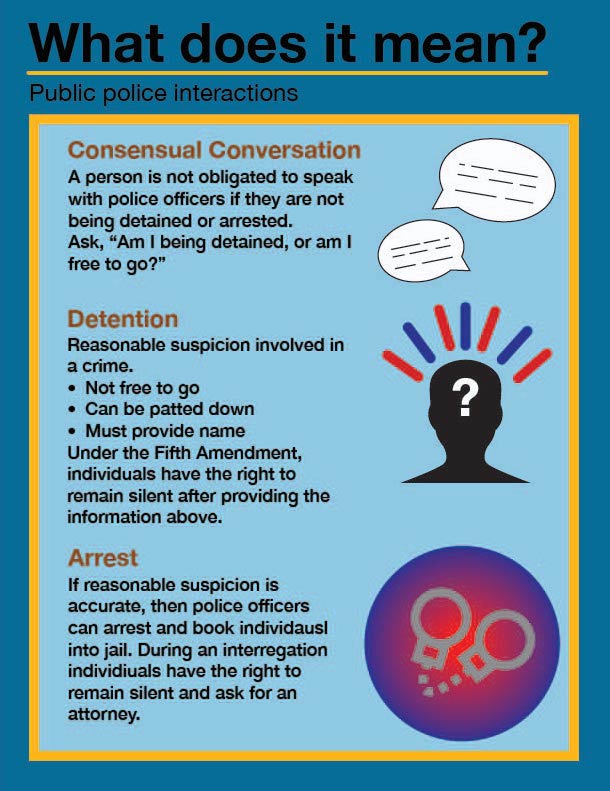Know your rights when interacting with police
Knowledge of constitutional rights is important for the community and students. This was evident in the police interaction with a Cal Poly Humboldt student that occurred at Fuente Nueva on Sep. 22.
Professor Anthony Silvaggio, chair of the Department of Sociology at CPH, has taught the Student Rights and Civil Liberties course in Fall 2018.
“I think it’s our responsibility as a university to also provide a Know Your Rights training for all students so … they’re informed and their rights are protected,” said Silvaggio.
Below is a compiled list of information gathered from experts on the matter of what rights people have during public police interactions. This is not legal advice, the intention of this article is to help inform individuals of their rights.

What are people’s rights when stopped by a police officer?
Owen Tipps, a lawyer and a deputy public defender from the Humboldt County Public Defender’s Office, said it is important for people to know their rights when stopped by the police.
“The Fourth Amendment protects citizens against unreasonable searches and seizures. The Fifth Amendment guarantees the right against self-incrimination. The Sixth Amendment provides the right to counsel and the right to jury trial. The rights conferred by these constitutional provisions come into play anytime a citizen is stopped by police or placed under arrest,” Tipps said through email.
When a person is stopped in their car, they must give their license and registration when asked, and have the right to remain silent after that, according to Silvaggio.
“If they ask you, you must exit the car. You can ask them, ‘Am I being detained?’ said Silvaggio. “If [they say] yes, then go ahead and ask ‘What is your reasonable suspicion?’ ”
If an officer responds that a person is not being detained, then that person has the right to leave, Silvaggio also explained.
Are people allowed to record their interaction with police?
“You have the right to video and audio tape police as long as you tell them that you are recording,” Silvaggio said. Additionally, people should make sure their act of recording is not interfering with an officer’s investigation.
According to attorney Tipps, however, people should proceed with caution.
Tipps advises that the First Amendment protects the right to record police in public, “but that may only apply to third parties [bystanders not involved]. In general it is not a good idea to start recording when you are subject to detention or arrest.” These days, most officers are required to have their body cams on during detainments and arrests.
When are people subject to search and seizure?
Silvaggio explains that a person is only subject to search and seizure upon detention or arrest.
“When doing detentions, they [officers] are allowed to pat you down within your reach,” Silvaggio said. If an individual has their belongings in a bag that is not within their reach, police cannot search that bag under detention, only under arrest.
Apart from detention or arrest, the main way an officer can do a search and seizure is by getting a warrant, but in some circumstances, this is not necessary, explained Lieutenant Peter Cress with the University Police Department at CHP. Cress said the Fourth Amendment provides exemptions to getting a warrant, such as for officer’s safety.
Are police required to state a reason for stopping someone?
Silvaggio said that officers “must articulate their reasonable suspicion for detention.”
“Under the Fourth Amendment, a police officer must have a reasonable suspicion of criminal activity in order to detain someone,” Tipps wrote in an email. Tipps added that reasonable suspicion, “is a suspicion that is based on specific, articulable facts that would lead a reasonable person to conclude that the person is engaged in wrongdoing.”
Emory Welton, deputy public defender from the Humboldt County Public Defender’s Office wrote through email, “When it comes to police encounters, you may be right that an order is unlawful, but failing to comply could cost you.”
Salvaggio, along with The Civil Liberties Defense Center from Oregon, are in the process of organizing a Know Your Rights event early next spring.




